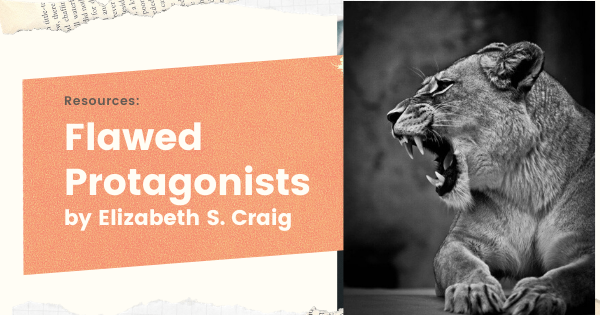by Elizabeth S. Craig, @elizabethscraig
I’ve worked on two of my series for so long that I can’t really even remember the genesis of the protagonists’ personalities. But I do remember creating their flaws. Both protagonists of the series have flaws that are closely modeled on my own as well as flaws of people I know well. I knew how those flaws trip me up and family up and it was easy to work those into the characters. The funny thing is that the protagonists are nothing like each other except when it comes to their flaws.
Developing a third series this year, I had to really sit down and think about flaws and which might be useful for the new sleuth. The last thing I wanted to create was a Mary Sue/perfect protagonist. I used a couple of tools to help me create Ann, including Angela Ackerman and Becca Puglisi’s book The Negative Trait Thesaurus to help me really consider the direction I wanted to go in.
If you have a character that’s too perfect, readers aren’t going to relate. We all have our flaws. Even Superman had kryptonite. It just gets boring reading about someone who never screws up. And I think it would probably make for a very short book, too.
Writing about my own flaws and the flaws of people I knew was the easiest way to tackle it. I was intimately familiar with them and their outcomes and it was cathartic writing about them. I was under a deadline or two with my publishers and it was really a no-brainer. But you can’t just pick on the same flaws for every new series.
Besides the book, I used a few favorite articles to help me hammer out my new sleuth’s issues:
September C. Fawkes’ post, “Fixing the Mary Sue Character in Your Story”
Janice Hardy’s “5 Traits to Help You Create Your Character’s Personality”
E.V. Scarlet’s “62 Character Flaws for Creating a Well-Balanced Character”
Amanda Patterson’s “123 Ideas for Character Flaws”
K.M. Weiland’s “5 Ways to Use the Enneagram to Write Better Characters”
What kinds of flaws have you saddled your characters with? How did you find inspiration for those flaws?
Resources for Creating Flawed Protagonists: Share on XPhoto on Visualhunt

Angela and Becca’s books are really handy, aren’t they?
For my current story, it was easy to come up with negative traits as they fit the story so well.
They’re great resources!
Excited about your work-in-progress, Alex!
Thanks, Elizabeth, for the reminder of how important character flaws are. As a writer, it can be appealing to imagine characters who are all good or all bad. It’s easier to write that way in some aspects. But as you say, nobody’s perfect, and readers want characters who resonate – who are like actual humans. And they are much more fun to write (or at least, I’ve found it to be that way). Thanks for those resources.
Fun to write and fun to read, too! Thanks for coming by, Margot.
I think flaws are fun to come up with. They often define the characters.
I think flaws are fun to write, too. Really helps the characters come to life.
Ooh…off to check out the Negative Trait Thesaurus! I’m a big fan of their Emotion Thesaurus.
It’s a great resource!
I haven’t read all your books, Elizabeth, but Myrtle’s flaws pop up front and center in her series. Her self-righteousness is sometimes–though not often enough for her–validated, and her impatience is legendary. And because she’s a former schoolteacher, her flaws are rooted in character. What I like about these flaws (among her others) is they’re not so off-putting that you think ill of Myrtle, and they’re universal enough that when they invariably lead Myrtyle into conflict, it never feels the least bit contrived.
Thanks so much for the kind words and encouragement, Bill! It’s a tricky balance to create a character as flawed as Myrtle and have her still be likeable. I’m so happy you think I got it right!
I always need help with creating characters. Thanks for the links.
Teresa
Hope they help, Teresa! Thanks for popping by. :)
The Negative Trait Thesaurus is probably my favorite Thesaurus of all. I don’t concentrate on negative traits in others, so it’s hard for me to build one in a character. This book has been a tremendous help. Thanks for the other titles, too.
It’s a great resource, isn’t it? And a good way to get solid ideas for character development.